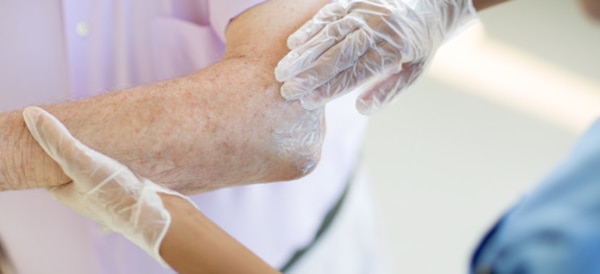Our delicate skin
Our skin becomes vulnerable with age. This means that the skin of elderly individuals is more prone to skin problems, and the need for proper skin care increases. We can help you maintain a care routine that promotes healthy skin.
Our skin becomes vulnerable with age. This means that the skin of elderly individuals is more prone to skin problems, and the need for proper skin care increases. We can help you maintain a care routine that promotes healthy skin.
The skin is a vital organ that serves to protect us from injury and infection. Thus, it is very important to understand several risk factors in order to maintain healthy skin.
The skin of elderly individuals is at particular risk because ageing skin:
Heals slowly and is prone to friction and shearing
Can be susceptible to degradation causing irritation, itching, infection or pain
Is sensitive to excessive moisture and prolonged contact with urine and faeces
Frequent cleansing with soap and water can also disrupt the skin’s integrity, reducing its ability to prevent infection. Soaps contain cleansing ingredients called surfactants that can cause irritation if left on the skin, even after rinsing.
The skin of individuals who have incontinence is vulnerable to a variety of threats, including incontinence-associated dermatitis and pressure ulcers.
Incontinence-associated dermatitis has been estimated to occur in 7% to 11% of incontinent nursing home residents [1]
Urinary incontinence increases the incidence of pressure ulcers more than 5 times [2,3]
Faecal incontinence increases the incidence of pressure ulcers more than 20 times [1,2]
Furthermore, the breakdown of skin arising from incontinence can have a considerable impact on an individual’s physical and psychological wellbeing. [5]

With care and management, many of these issues can be prevented or minimised. For example, the incidence of pressure ulcers, which are very expensive to manage, can be reduced by as much as 50% by following proper care routines. [6-8]
A good hygiene routine, especially designed for fragile elderly skin, can help prevent skin irritation and infection. When following each episode of incontinence, an optimal routine helps to prevent the occurrence of incontinence-associated dermatitis; it should include gentle cleansing, application of a moisturiser and the use of a skin barrier or protectant only if necessary. [5]
In addition to clinical benefits, a good hygiene routine can help residents feel comfortable, refreshed and healthy as well as support their self-esteem, independence and overall quality of life.
TENA is a brand of Essity, a leading global hygiene and health company. With over 60 years of experience TENA is the No 1 adult incontinence brand globally*. We offer a full range of absorbent products, skincare and digital health technology solutions that are tailored to the needs of individuals, their families and healthcare professionals.
With TENA, Essity is at the forefront of developing products and services that help improve dignity and the quality of people’s lives. We strive for sustainable continence care with better care and better products.
*Euromonitor International Limited; Retail Adult Incontinence, all channels, RSP value sales, Tissue & Hygiene, 2023 ed
At TENA we offer products and solutions for a wide range of people. You are always welcome to visit our other TENA sites.